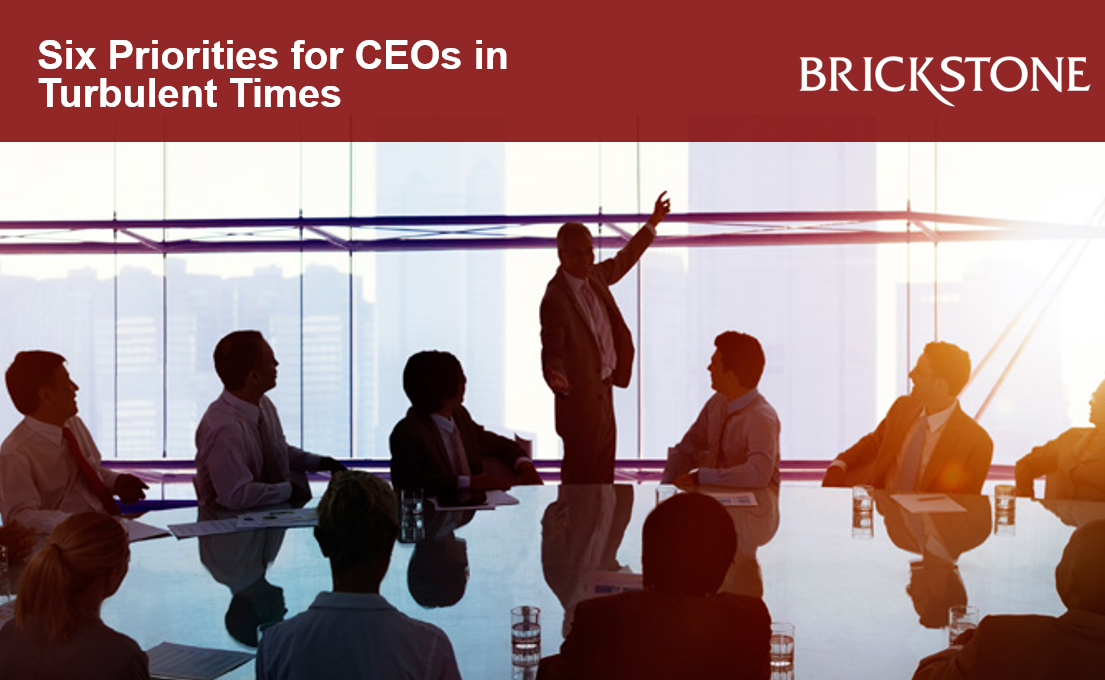Six Priorities for CEOs in Turbulent Times
CEOs in Turbulent Times
Warning lights are flashing in the global economy as high inflation, drastic rate hikes, ongoing supply shortages, and the war in Ukraine take their toll. We are indeed in unsettled times right now.
According to some forecasters, there is currently a 98.1% chance of a global recession as economists dialed back their forecasts for growth and expect inflation-adjusted wages to keep falling the rest of this year and next. All these drastic economic conditions have certainly presented leaders with plenty of challenges.
Despite these economic troubles mounting, experts say that executives should see this time as a great moment of opportunity for companies to differentiate themselves.
This article by Brickstone reviews McKinsey’s publication on priorities for CEOs in turbulent times, highlighting key facts and insights.
Priorities for CEOs in Turbulent Times
Current economic conditions pose huge challenges for company executives as they face an uncertain environment change, projected to disrupt companies’ anticipated growth, including earnings. This situation has not only created real turbulence for the business community, but has also solidified the decision making process of business or companies.
With economic troubles mounting, it’s time to tighten belts and put on hard hats. But don’t forget the jet pack, to accelerate into the next phase of growth.
On what matters most today for CEOs, McKinsey spoke with hundreds of leaders this year and found six priorities that feature prominently on CEO agendas worldwide. They’re the moves leaders are taking to shore up defenses and gain ground on rivals—which is very different from the purely defensive agenda that many companies are following.
According to McKinsey, the top priorities for a company’s top executive in today’s environment would be the following:
Resilience: According to McKinsey, no doubt, it is a corporate buzzword, but if you strip away all the extraneous baggage that the concept has collected, resilience is emerging as a vital “muscle” for companies operating in a world of endless volatility and disruption. In a volatile and disruptive world, it is the priority par excellence in its different aspects: financial, operational, technological, organizational, business model and reputational resilience.
Courage: A second priority centers on an old-fashioned virtue: courage. With lots of indicators flashing red, it’s tempting for business leaders to pull back a bit, postpone some initiatives, and scale back on growth plans. Tempting, but wrong (for most companies). The best leaders and companies are ambidextrous: prudent about managing the downside while courageously pursuing the upside. However, the best leaders not only focus on prudent management of the difficulties of the current cycle but are also attentive to seek opportunities that may arise and bet on long-term strategies and projects outside the manual.
Building New Businesses Seeking Growth: With a vision of start-ups and unicorn companies, more than half of the executives prioritize creating companies in high-growth sectors. Consolidated companies have something that start-ups may miss such as resources, capital, assets. According to Mckinsey, one of the most profitable sectors in the future and with the fastest growth will be green technologies.
Improving Technology and Digitization: To build new businesses and to strengthen resilience and take the initiative in the old ones, it is essential to have the right technology and continue advancing in the digital transformation of companies. That’s especially true when going after new green business opportunities as technology is always evolving, offering new opportunities to CEOs looking to transform their business.
Going Forward with Net-zero Emissions Commitments: Despite the difficulties and pressures caused by the energy crisis caused by the war, environmental commitments continue to be on the agenda of executives and will transform business. According to McKinsey, the goals of sustainability, economic competitiveness, affordability, and national security dovetail as never before. It’s up to CEOs to adapt, mitigate, and knit these concepts into a vehicle that goes from zero to net zero.
Strengthen or Rebuild Employee Experience: After Covid and the emergence of work from home, it will be key to improve employee satisfaction and improving employee satisfaction and sense of pride in being part of the company will be key to solve the talent retention and attraction issues observed in many companies. According to McKinsey, CEOs need to think hard about the office of the future, a place where workers want to be—to see friends, riff on new ideas, and find enough meaning in their work to get them through the next week of pallid video calls.
Read the complete publication here.





